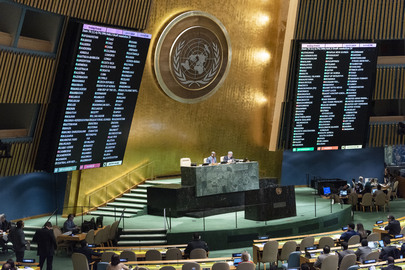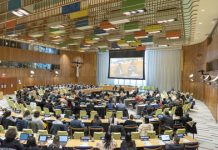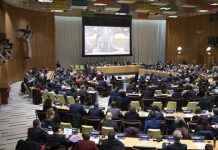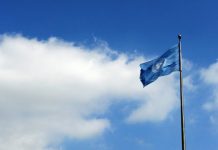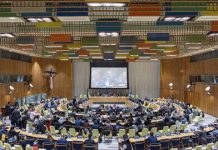UN News: Could you give us an overview of the situation on the ground in the areas affected by the earthquake?
Amy Martin: The situation on the ground as we have it now, we have earthquake, shallow earthquake that hit Nangarhar province on the eastern side of Afghanistan near the Pakistan border that has affected four provinces principally, Kunar, Nangahar, Lagman and Nuristan.
Early on, we have roughly 800 people killed, over 2,000 injured. We anticipate that the numbers are going to climb. It’s a very remote area. Much of the housing is traditional housing made of mud. Because the earthquake was so shallow, a lot of destruction to structures and so we can anticipate higher casualty figures as we go.
20 emergency rapid assessment teams have been deployed to as many regions as they can reach. Again, it’s a mountainous region. There was heavy rain a few days ago, so that’s prompted landslides and rockslides, so we’ve had some roads obstructed.
The local authorities have cleared one road, but not the other, and so everyone’s joining up efforts to get to these places. Right now, it is the first 24 hours, so search and rescue is the primary initiative and critical initiative at this time. A lot of red crescent joined up with humanitarian partners, NGOs, UN, local authorities of the National Disaster Management Agency are all working together, coordinating, and getting to areas for right now search and rescue.
But we can imagine that the needs are going to climb for shelter, for tents, for tarpaulins, for blankets with the cool weather in the highlands, as well as hot meals and food that’s also being made available. Mobile health teams have been sent to some of the districts and some of areas.
The authorities have deployed helicopter assets to help evacuate critically injured to the provincial hospital in Jalalabad and as well Kabul. Efforts are being made on all fronts. Mobile teams with the medical supplies are going to be in short supply. That’s going to be a gap. Making sure that we can do that trauma care and that initial first aid, which is critical.
UN News: Reports suggest that many of the victims had returned to Afghanistan from Iran and Pakistan in recent years. Can you give us a sense of how large this returnee population is and how they have been impacted?
Amy Martin: This year we anticipate 1.7 million people returning from both Iran and Pakistan. This is on top of the 1.5 million people that arrived last year. So, we’re looking at 2.5 million people combined in the past years of returnees. So, a lot of people to absorb for Afghanistan. There’re reports of some of the returnees are in this area. We don’t have a final number, it’s early days and we are waiting for the assessment teams to provide more information as we go.
UN News: You mentioned the efforts being made by the local authorities. They are making sure that helicopters are available. What’s the level of coordination between UN agencies and local authorities? What would you say is the biggest challenge the UN is currently facing or may face in delivering aid in the days ahead?
Amy Martin: The coordination is very decentralized, it’s very localized in the provinces. And so that’s where we’re seeing a very good joined up effort for the coordination. We at the capital level equally, lots of meetings have been taking place today, more will follow tomorrow with the various ministries and the operational line ministries that are mobilizing support, like Ministry of Health, the National Disaster Management Agency, etc. with all of the partners.
The obstacle for assistance to meet the needs of, again, we still don’t know the scale of the response that’s going to be required. We’re rapidly developing that response plan, but meanwhile we can anticipate a lot of shelter destruction and housing destruction given the shallow nature of the earthquake and the nature of the housing in the mountainous region.
We can anticipate a lot of medical and mobile medical teams and medical supplies will be needed early on, as well as hot meals and food assistance for the survivors who are being temporarily housed. The obstacle to that, roads. Landslides and rockslides have blocked roads. They have to be, and the authorities are clearing those roads as they can. One road has been cleared today; they’re working on a second road to clear.
We need air assets. The UN and UNHAS does not have an operational helicopter in Afghanistan. The area is remote. We don’t have a landing strip there for fixed-wing aircraft, so we need the helicopter to go in. So these resources are the resources that we really need. And with the funding shortages and the cuts that we’ve seen across the board from a lot of our donors this year, programs have shrunk. Resources have shrunk. Staff, our footprint has shrunk, so to gear up and to scale up rapidly is going to be a challenge. We’re all pulling together, we’ll do it, but the cost is going be high.
UN News: You mentioned that funding is going to be a big challenge and then we all know Afghanistan is already facing multiple challenges. Now, how will this disaster affect ongoing humanitarian operations in the country, considering the existing needs and the amount of funding you already have?
Amy Martin: So, this crisis is a crisis inside a crisis, right? We have the drought. The drought is severely affecting the Northern provinces and it’s starting to affect some of the central areas as well. The response to the drought is ongoing. We mobilize funding for anticipatory action against the drought, and we have a follow up funding grant for drought affected areas.
But it’s shifting, that pattern of drought is shifting. And the second crisis is really the returns, the returns from Pakistan and Iran, absorbing that community into Afghanistan and scaling up their integration and support for them to have livelihoods and is going to be. So, it’s a compound, you know, it’s a combination of things that are compounding the response effort here.
UN News: What message would you like to convey to the global community, international donor community regarding this crisis and the need for immediate assistance, ensuring immediate assistance to the affected population.
Amy Martin: Well, we’re up against time, right, and an earthquake response, you’re trying to deploy and find as many survivors as possible in the initial hours. Then we need to move toward recovery and then the immediate and medium-term response to help people who are displaced from losing their house and their livelihoods. We want the community to not forget the people from here in Afghanistan. We want them to be generous in their support to their organizations that are providing active support in this area, whether they’re a local non-governmental organization, an international non-governmental organization or the UN agencies. Everyone is all hands-on deck here to assess and to fill those gaps and needs to support the community. So, my message is: Please help the Afghan people, help support the initiative and the efforts that are ongoing now.
Source of original article: United Nations (news.un.org). Photo credit: UN. The content of this article does not necessarily reflect the views or opinion of Global Diaspora News (www.globaldiasporanews.com).
To submit your press release: (https://www.globaldiasporanews.com/pr).
To advertise on Global Diaspora News: (www.globaldiasporanews.com/ads).
Sign up to Global Diaspora News newsletter (https://www.globaldiasporanews.com/newsletter/) to start receiving updates and opportunities directly in your email inbox for free.


